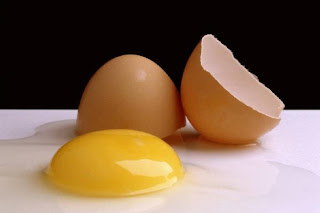 Eggs do contain a fairly high cholesterol, 213 milligrams per item. Therefore, the food sources of these proteins had previously been declared as a major cause of heart disease. In fact, cholesterol from food is not the major cause of clogged arteries, but saturated fats and trans fats.
Eggs do contain a fairly high cholesterol, 213 milligrams per item. Therefore, the food sources of these proteins had previously been declared as a major cause of heart disease. In fact, cholesterol from food is not the major cause of clogged arteries, but saturated fats and trans fats.
The risk of heart disease than healthy breakfast this one is more due to the mixtures, especially butter, which has a higher saturated fat content than the egg itself. Therefore, you can suppress the amount of saturated fat by eating a boiled egg.
The experts stated that the eggs contain healthy nutrients and are generally safe if limited to one item per day. Also, try to reduce cholesterol from other food, like meat. You should consume no more than 300 milligrams of cholesterol per day.
Here are some interesting facts about eggs:
- Prevent loss of vision. Egg yolk contains lutein and zeaxanthin, two antioxidants that help prevent macular degeneration, the leading cause of blindness. Macular degeneration is a disorder of vision in the center of vision (macula) due to damage to the retina.
- Eggs contain salmonella bacteria. Therefore, it is best to avoid products containing raw eggs, including milkshakes and cake batter. To ensure the eggs are free of bacteria, cook at a temperature of 160 degrees before consumption.
- Cholesterol is only found in egg yolks instead of egg whites.
- Eggs are good sources for protein, iron, and zinc. However, eggs contain less fiber.
- An egg provides 12 per cent (6 grams) of your daily protein recommendations.
- Green stain on the eggs that have been boiled is harmless and not a sign of poisoning bacteria.
- The fresh egg, the harder shelled.
- A single egg contains about 75 calories.
- Content of choline in eggs serves to support brain and memory development in fetuses and adults.
- Eggs contain vitamins A, B12, D and E, but do not contain vitamin C.
The National Academy of Sciences recommends that pregnant women should consume 450 grams of choline per day. This amount is equivalent to two eggs. One egg, including egg yolks, contains about 250 milligrams of choline.
Source of good nutrition is in Eggs.
One large egg contains 6.25 grams protein, 75 calories and 13 essential vitamins, also contains minerals. Most of the protein is in egg whites, while vitamins, minerals and fat terkadung in carotenoids or yellow pigments that exist in the egg yolk. In addition, egg yolks also contain cholesterol.
The best way to enjoy eggs:
- Enjoy the scrambled egg, omelet or a frittata (Italian omelet with vegetables and diced meat)
- Mix the eggs with the mixture from the food guide pyramid (the Food Guide Pyramid) to make various kinds of food.
- Combine eggs with remaining vegetables, pasta or chicken for food to be more creative and easy, inexpensive and full of nutrients.
Eliminate the risk of food-bourne illness.
Foodborne disease is caused by consuming contaminated food or beverages. In the website of Online Agrinews, Foodborne disease is caused by various microorganisms or microbial pathogens that contaminate food, so there are a variety of infectious foodborne diseases.
In addition, poisonous chemicals, or other harmful substances can cause foodborne diseases if such substances contained in food. Foods derived from animals and plants can act as carriers of microorganisms that cause disease in humans.
To prevent food bourne when about eating eggs:
- Wash hands before and after holding a raw egg
- Separate raw eggs from other amkanan, especially of foods that do not need to be cooked-Store eggs in cardboard cartons in the coldest place in the fridge.
- Cook eggs and serve immediately, when the eggs should be cooked at a temperature of 160 degrees Fahrenheit.
Monday, November 29, 2010
Egg Consumption and the Facts Behind it
Subscribe to:
Post Comments (Atom)
Labels
- Disease (4)
- Fitness (7)
- Food (14)
- Knowledge (1)
- Life Style (22)
Archives
-
▼
2010
(33)
-
▼
November
(20)
- Egg Consumption and the Facts Behind it
- Detoxify Your Body Now !
- Natural Diet Tips, safer and healthier
- Dangers of Slimming Drug and Weight Loss Medication
- Milk Chocolate for Health
- Fruitarianism, assuming that the fruit has the hig...
- Are you ready to become a vegetarian?
- Healthy by laughing
- The great benefits of Avocado
- Vitamin C in fruit
- Wake up early, even in times of winter!
- Maintain a healthy body in the winter
- Simple but important! Tips to stay healthy
- Healthier life with tropical fruit
- List of healthy foods for our heart
- The importance of breakfast
- What you should know about mineral water.
- Healthy life is not difficult!
- 5 easy ways to live healthy
- Healthy living is easy
-
▼
November
(20)
0 comments:
Post a Comment